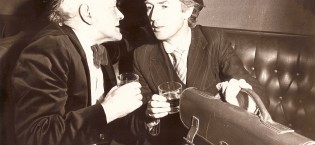Sligo Drama Circle in “God’s Gentry”
 The day is long gone when Sligo audiences first began to sit up and take notice of the fact that acting is an art which, in this town, could never be deprived of nourishment. This belief was only too clearly brought forcibly home to us this week when the Sligo Drama Circle staged Donagh Mc Donagh’s “God’s Gentry” in the Town Hall. The experience and talents of the actors and actresses were richly blended throughout with the result that the production lacked nothing as far as entertainment was concerned. Admittedly, this type of play might not be everybody’s cup of tea, but when Paddy Dooney thanked the audience on Tuesday night he remarked that this was the first occasion that a play in such a medium had been staged in Sligo and that, from the warm manner in which it had been received, he got the impression that everyone thoroughly enjoyed it. IN both instances, Mr. Dooney painted a true picture.
The day is long gone when Sligo audiences first began to sit up and take notice of the fact that acting is an art which, in this town, could never be deprived of nourishment. This belief was only too clearly brought forcibly home to us this week when the Sligo Drama Circle staged Donagh Mc Donagh’s “God’s Gentry” in the Town Hall. The experience and talents of the actors and actresses were richly blended throughout with the result that the production lacked nothing as far as entertainment was concerned. Admittedly, this type of play might not be everybody’s cup of tea, but when Paddy Dooney thanked the audience on Tuesday night he remarked that this was the first occasion that a play in such a medium had been staged in Sligo and that, from the warm manner in which it had been received, he got the impression that everyone thoroughly enjoyed it. IN both instances, Mr. Dooney painted a true picture.
For the producer, Dr. Timothy Mc Keogh, there were no guiding precedents. He could not look back on other years for his inspiration – an inspiration that can do so much to strengthen one’s confidence – as he was well aware of the fact that as long as producers have been endeavouring to stage top-class presentations in the town, nothing quite like this had ever been attempted. Mindful of this fact, the members of the cast and the producer must take full honours for a delightful and highly entertaining show.
The scene was that of a little Mayo village of Knockderry and the story dealt with the lives of the tinkers who frequented the village. The tinkers were, however, seemingly good-natured fellows. Their motto was to eat, drink and be merry and seldom was a second thought given to the accrual of wealth or property. On the other side of the fence was a wealthy publican with his meek and timid wife. Their daughter assumed the role of the devil-may-care female of the present day while her actions were usually unbecoming and highly irrational. The two classes were thrown together and in their proper perspective the scene was just as one might imagine it.
The transformation, however, brought different results, The tinkers were given powers which they had hitherto enjoyed while the publican, his wife and daughter were reduced to nothing. If ever before, here was a case in which the relationship between the wealthy and the poor was clearly portrayed and the results truly emphasised. One might even go so far as to describe it as a study in psychology. Although the tinkers did not show it, their minds were working overtime. Here they were, hurled into a world which was completely new to them. That they misused their privileges was no secret and no surprise. They were out of place and they knew it. The publican, too was out of place but he adapted himself to the conditions and was content to bide his time. Here was a man with an educated mind who could see what the future would bring and, in the end, his wishes won through and his predictions bore fruit. The story revolved around these two classes and the other characters worked immensely to strengthen the performance and buoy up the overall presentation.
The play departed from the orthodox fashion in that the singing and dancing of the tinkers had the effect of turning the play into a light opera. The only difference of course was that the songs were all Irish Ballads with words to suit the occasion. John Melody, the publican, was played by Paddy Dooney who, in past years, has given so many memorable performances. His experience held sway from the start and as the miserly person who stored his money in the safe, all the angels in heaven to guard it, he was an interesting character. As the man who realised that life was passing him by and that he was not making the most of it, he was a kind and loveable creature. At times scheming and cunning, the manner in which he strutted calmly across the stage was undeniably in the very best interests of amateur showmanship. Although he had to bow to the way of the tinker, he remained inflexibly antagonistic towards them to the very end. His peculiar use of adjectives and pronouns added to his behaviour and demeanour.
Manks Mongan, the tinker who won the heart of John Melody’s daughter, Nora, was played by Eddie Fitzpatrick. Eddie is a new asset to the Drama Circle and, from all appearances, a very valuable one. There was only one thought immured in his mind and that was to carry off Nora Melody and he succeeded in doing this with the aid of his soft talk and ever-present charm. This charm was transferred from the character to the individual and his nonchalant style of acting won not only the heart of Nora Melody but of the entire audience.
Monica Toher, as Nora Melody, was torn between the love she had for her father and the love Marks Mongan had for her. It did not take her long to discover that her place was with her father and with her own type. The omnipotent rule of the tinkers even failed to separate her from her father although she could have ruled the tinker camp. She did defer her decision for a year but was quite sure that the ephemeral happiness she found with Marks could never satisfy her. Her acting was always sincere and never artificial. Her facial expressions and stage presence were two of her outstanding features.
The part of Mary Melody, wife of John Melody, was taken by Mary Mc Govern and she instilled into her role that simplicity which makes this character so likeable. She never seemed to quite realise what was going on and took things just as they came. She was not perturbed by the looting of the shop or the flight of her daughter and one could sense this easiness in her voice. Her often untimely remarks set the audience at ease and in the end her soft manner won through. Within the tinkers’ camp the belief that all’s fair in love and war was prevalent. Betsy Connors, played by Marie Mulvihill, fell in love with Manks Mongan but was jilted when the latter looked further afield. Her fiery and impetuous portrayal was thoroughly convincing. As the pert maiden who had been sadly let down, her actions never fell short of what one would expect from such a character, while her saucy and impudent remarks added to the comical side of the story.
Larry Ward, who finally won he heart of Betsy Connors, was played by Brian Bohan. As before, here was a young actor who lived the part. He approached the heart-broken but defiant Betsy with the utmost diffidence and by kind words and actions won her over. A well-balanced and commendable performance. Eddie McDermottroe took the part of Adolph who was, perhaps, the leader of the tinkers. It would be difficult to really set down the impression which was his dress, make up and, most important of all, his skill as an actor brought home to us. His loud laughter and boisterous singing did much to depict the true picture of the tinker camp. The strong arm of the law was represented by Joe Mc Morrow as Sergeant Dethe and George O’ Donnell as Guard Bansha. Both were hilariously funny and as usual the characters managed to get the usual “cracks” at the Garda Siochána. Although the parts were relatively small, the two who have been long connected with dramatic entertainment, acquitted themselves in masterly fashion.
Other parts were played by Aiden Ballantyne, a strong-minded Petronious Ward; Celia O’ Donnell, a quite, but nevertheless joyful Molly Ward; Joan Burnside, a musical Meg Ward; Jimmy Gilmartin, a firm Mogue Ward; Eric Koss, an agile and at times ferocious Mick; Maisie McDaniel, a heart-warming Maisie and Andy Barry, a tuneful accordionist. The part of Balor of the Evil Eye was filled by Michael O’ Rourke who did his piece with all the necessary cunning and craft of a devil. Recalled from the days of St. Patrick he granted the wishes of the tinkers but fell out of favour when he proposed they should work for their living. The remaining tinkers, without whom the play could never have been a success, were Mary Gilmartin, Noreen Patton, Deirdre Carroll, Mary Lu Rafferty, Harry Langan and John Scanlon.
A word of praise and congratulations to the producer Dr. Mc Keogh who handled the production end tactfully. There were so many scenes in which things might have got out of hand but they were allowed to go just so far and no more. The Marist Brothers’ Céili Band who supplied the music are also to be sincerely thanked. Settings – Joe Burns; Stage Manager – Una Lappin; Make-up – Monica Toher and Marie Mulvihill; Lighting – Dermot Murphy and heating by J. Meldrum and Sons Ltd., Sligo. The proceeds will go to the F.C.A Welfare Fund.
from The Sligo Champion, by a Special Representative, February 21st, 1959
Tags: Donagh Mc Donagh, History, Press Reports, Reviews






